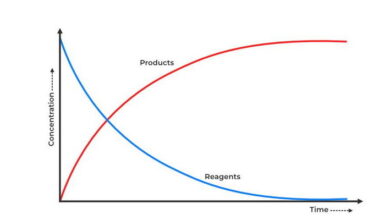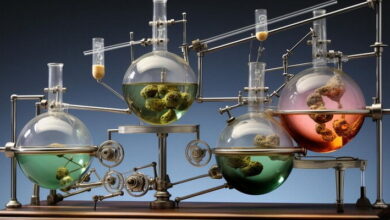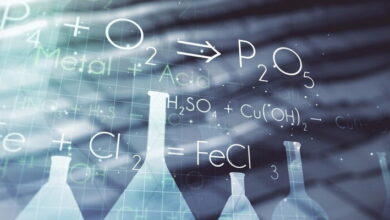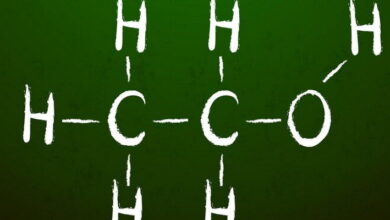Chemical Kinetics MCQs with Answers

Welcome to the Chemical Kinetics MCQs with Answers, it helps learners quickly identify areas for improvement in Chemical Kinetics Online Test.
| Chemical kinetics is the study of the rates of chemical reactions and the factors that influence them. It explores how reactants transform into products over time, providing insights into reaction mechanisms, reaction rates, and the principles governing these processes. Understanding chemical kinetics is crucial for optimizing reaction conditions in industrial processes, designing efficient chemical reactors, and predicting reaction outcomes.
For students and professionals, Chemical Kinetics MCQs with Answers are valuable tools for mastering this field. These multiple choice questions cover a wide range of topics, including rate laws, reaction mechanisms, determining reaction orders, and calculating rate constants. Multiple Choice Questions on Chemical Kinetics in quizzes provide practical scenarios where learners can apply their knowledge to solve problems related to reaction rates and mechanisms. These quizzes often assess understanding of how factors like temperature, concentration, pressure, and catalysts affect reaction rates and equilibrium. A Chemical Kinetics Practice Test allows individuals to assess their understanding comprehensively and identify areas that require further study. It helps in reinforcing concepts and preparing effectively for exams. Chemical Kinetics Exam Questions typically require a deeper understanding and application of kinetic principles, such as interpreting experimental data, predicting reaction behavior under different conditions, and proposing mechanisms based on kinetic evidence. Mastering chemical kinetics is essential for advancing both theoretical understanding and practical applications in chemistry. |
Chemical Kinetics Online Quiz
By presenting 3 options to choose from, Chemical Kinetics Quiz which cover a wide range of topics and levels of difficulty, making them adaptable to various learning objectives and preferences. You will have to read all the given answers of Chemical Kinetics Questions and Answers and click over the correct answer.
- Test Name: Chemical Kinetics MCQ Quiz Practice
- Type: Quiz Test
- Total Questions: 40
- Total Marks: 40
- Time: 40 minutes
Note: Answer of the questions will change randomly each time you start the test. Practice each quiz test at least 3 times if you want to secure High Marks. Once you are finished, click the View Results button. If any answer looks wrong to you in Quiz, simply click on question and comment below that question, so that we can update the answer in the quiz section.
Download Certificate of Chemical Kinetics Test
On the end of Quiz, you can download the certificate of the quiz if you got more than 70% marks.
Chemical Kinetics Flashcards
Which term describes the change in concentration of reactants or products per unit time?
Rate of reaction
What is the rate law expression for a reaction of the form aA+bB→cC+dDaA + bB rightarrow cC + dDaA+bB→cC+dD?
Rate=k[A]a[B]bRate = k[A]^a[B]^bRate=k[A]a[B]b
What is the order of a reaction with respect to a particular reactant defined as?
The exponent of the reactant concentration term in the rate law
What is the formula for the rate constant (k) of a first-order reaction?
k=ln(2)t1/2k = frac{ln(2)}{t_{1/2}}k=t1/2ln(2)
What is the half-life of a reaction?
The time required for the concentration of reactant to decrease to half its initial value
Which type of reaction exhibits a linear relationship between the natural logarithm of concentration and time?
First-order reaction
What is the integrated rate law for a first-order reaction?
ln[A]=−kt+ln[A]0ln[A] = -kt + ln[A]_0ln[A]=−kt+ln[A]0
What is the formula for the rate constant (k) of a second-order reaction?
k=1[A]k = frac{1}{[A]}k=[A]1
What is the half-life of a second-order reaction?
t1/2=1k[A]0t_{1/2} = frac{1}{k[A]_0}t1/2=k[A]01
What is the integrated rate law for a second-order reaction?
1[A]=kt+1[A]0frac{1}{[A]} = kt + frac{1}{[A]_0}[A]1=kt+[A]01
What is the formula for the rate constant (k) of a zero-order reaction?
k=[A]tk = frac{[A]}{t}k=t[A]
What is the integrated rate law for a zero-order reaction?
[A]=−kt+[A]0[A] = -kt + [A]_0[A]=−kt+[A]0
What is the overall order of a reaction if the sum of the exponents in the rate law expression is 2?
Second order
What is the term for the minimum amount of energy required for a reaction to occur?
Activation energy
What does the rate constant (k) depend on according to the Arrhenius equation?
Temperature and activation energy
Which factor affects the rate of a chemical reaction by providing an alternative reaction pathway with lower activation energy?
Catalyst
What is the term for a substance that increases the rate of a chemical reaction without being consumed in the reaction?
Catalyst
What is the rate law expression for a reaction with an intermediate?
Rate=k[A]m[B]nRate = k[A]^m[B]^nRate=k[A]m[B]n
What is the term for the number of molecules that react in a collision with energy exceeding the activation energy?
Frequency factor
What is the term for the process by which reactant molecules collide and form products?
Collision theory
What is the term for the state in which the rate of the forward reaction is equal to the rate of the reverse reaction?
Chemical equilibrium
If you are interested to enhance your knowledge regarding Physics, Computer, and Biology please click on the link of each category, you will be redirected to dedicated website for each category.




